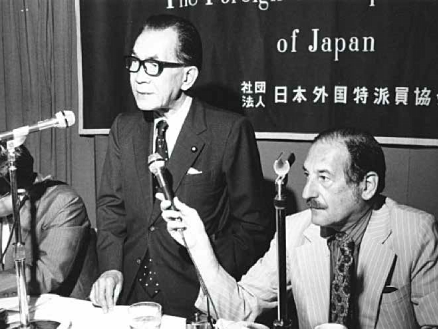Issue:
From now until our 70th anniversary in November 2015, we will turn these pages over to the history of the Club, both of the many esteemed and important guests who faced us – and the world – from the FCCJ dais and of the many Members who have made the Club such a fascinating place to be.
MAX AND “MR. CLEAN”

Deputy Prime Minister Takeo Miki, the “Mr. Clean” of Japanese politics who would succeed Kakuei Tanaka as Prime Minister the following December, being introduced by FCCJ president and photographer Max Desfor (AP) at an FCCJ luncheon on July 31, 1974. Max was awarded the Pulitzer Prize for his photo of refugees scrambling over the remnants of a destroyed bridge that spanned the Taedong River, taken on December 4, 1950. Another photo in which Max appears (page 49 of the Club’s history book) shows what it was like covering the Korean War at that time.
TAKEO MIKI WAS NO stranger to the FCCJ or to politics. Educated at both Meiji University and the University of California, he served in the Diet from 1937 until his death in 1988, even winning a seat during the war years when he opposed Tojo’s military government. Although he had held ministerial posts from 1947, it was after he became Minister of Foreign Affairs in 1966 that his relationship with the Club blossomed as he became “our official godfather” (the Foreign Ministry was the sponsor of the FCCJ). The highlight, no doubt, was a reception on the evening of May 25 of 1967 to celebrate the completion of the Club’s renovation in which he was our guest of honor.
Takeo Miki’s appearance at the professional luncheon on July 31 was special, however. He had just resigned from the Tanaka Cabinet over alleged financial irregularities by the Prime Minister, igniting a chain of events that led to Tanaka’s downfall (in which a major link was his appearance at the FCCJ on October 22). Miki succeeded to the post of Prime Minister in December, but his attempts at reform of the LDP ended in failure and two years later, in December of 1976, he resigned to take responsibility for the LDP’s loss of power.
As for Max Desfor, his fame did not end with the Korean War photos, which followed his recording of other historic events, including the landing of the Enola Gay after the bombing of Hiroshima and the Japanese surrender on the USS Missouri. He went on as a widower to remarry in 2011 at the age of 98 to a widowed lady of 92. Max turned 100 in 2013 and is still going strong, living in the Washington, D.C. area.

